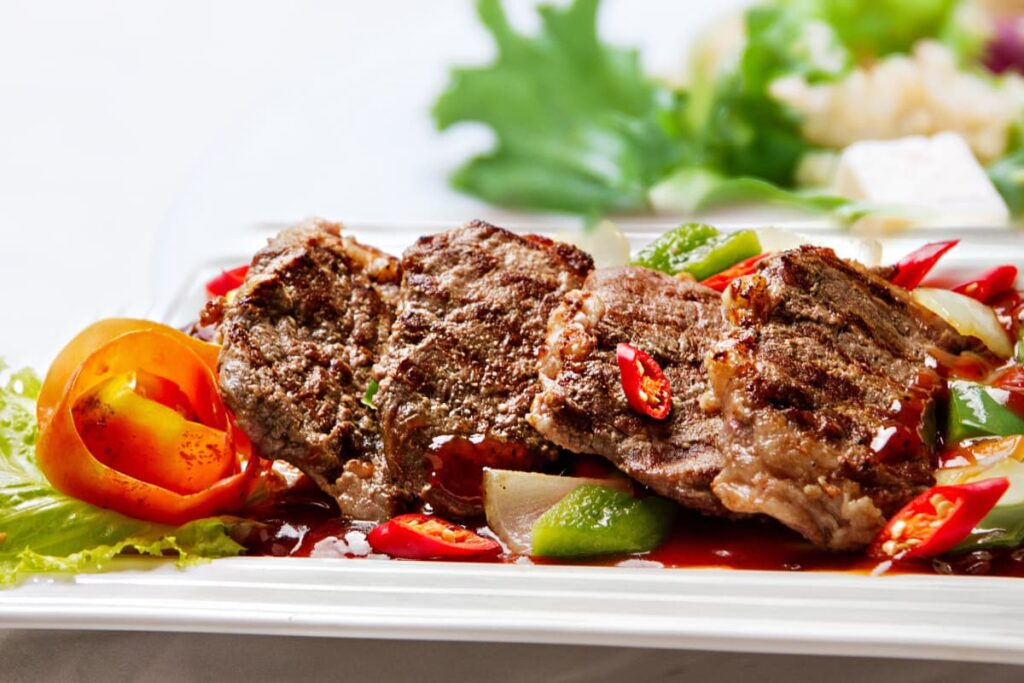When you’re craving a burger, nothing hits the spot quite like Burger King. But if you’re not careful, your burger might contain more than just beef.
At Burger King, they pride themselves on their commitment to serving top quality food to their customers. They also have a strict policy of using only the freshest and highest-quality ingredients in all of their products. So where does Burger King get their beef? From Tyson Foods, the world’s largest processor and marketer of chicken, pork and beef products!

Where Does Burger King Get Their Beef?
Burger King gets their beef from a variety of sources, including the US and Canada. They also use some beef from South America, Australia, and New Zealand.
At Burger King, they use three different cuts of beef: chuck steak, sirloin steak and ground beef. They do not use any mechanically separated meat in their products.
The company states that they are dedicated to serving only 100% USDA-inspected beef with no added hormones or steroids.
Does Burger King buy from a local butcher or do they have their own farms?
Burger King does not own any farms nor do they slaughter their own cattle for beef. Instead, they buy from other suppliers that have already processed their meat into ground beef or steak cuts before selling it to Burger King’s suppliers (such as Sysco).
However, Burger King does own a few farms where they raise chickens which they then use as ingredients in many of their sandwiches such as the Big King Sandwich or Whopper Jr.
How long does it take to get the meat from the farm to the store?
The beef that goes into the burgers at Burger King comes from cattle raised on farms across America. It’s processed, packaged, and shipped to restaurants around the country.
The beef is usually frozen when it arrives at the restaurant, so it can be kept cold during its journey. The meat is kept in the freezer until an order is placed by a customer. When an order is placed, the restaurant staff thaws out enough beef to make a single burger, fries and drink. Then they cook it on a grill or in a microwave oven.
Does Burger King source any of their beef from abroad? If so, what countries do they get their beef from?
Burger King sources its beef from all over the world. They are a multinational company, after all!
In the US, they source their beef from places like Kansas, Nebraska, and South Dakota. In Canada, they source their beef from Alberta or Saskatchewan. In Brazil and Argentina, they source their beef from Brazil and Argentina (duh). In Uruguay and Brazil, they get their beef from Uruguay and Brazil. And in Mexico? They get it from Mexico!
What does Burger King do to ensure that their beef is as high quality as possible?
Burger King is committed to only using the highest quality beef in their burgers, and they make sure that their beef is as high quality as possible by doing a few things:
- They source their beef from farms, ranches, and processing plants that meet the standards of the American Meat Institute.
- They work with suppliers who are members of the Global Animal Partnership, which means that these suppliers have agreed to adhere to welfare standards for animals raised for food.
- They have strict requirements for all animals used for meat production, including regular checks of facilities and practices, as well as audits from third parties.
- They also refuse to purchase any meat from suppliers who don’t meet these standards or who violate them knowingly.
Does Burger King produce any of their own beef? If so, how much do they produce on an annual basis?
Yes, Burger King does produce some of its own beef. In fact, a whopping 20% of the burger chain’s beef comes from its own farms.
The company has been working to make sure that it can provide as much of its food as possible in-house, and it has been pretty successful so far. They started out with a farm in Brazil, but they’ve since expanded to include farms in the US and Canada as well.
In 2016, Burger King was able to provide enough meat for their restaurants to get through the year without having to buy any from other suppliers!
FAQ’s
Burger King uses frozen meat because it’s a more cost-effective way of making sure that their supply of beef is always available, no matter what time of year it is.
Burger King has developed a special process called “flash freezing” that helps protect the integrity of their beef until it gets to your local restaurant. This process involves freezing the beef at -35 degrees Fahrenheit and storing it at -18 degrees Fahrenheit.
Burger King’s beef is prepared in accordance with strict international standards. It is produced without added hormones or antibiotics. The company also avoids the use of animal by-products in its products.
Each year, Burger King sells over 1 billion pounds of beef globally!
The beef we use is sourced from a variety of countries throughout the world, including Australia, Canada, New Zealand, and the United States. We look for suppliers who meet our high standards for quality and safety.
We believe that we should be able to provide you with the best quality food possible at affordable prices—even if that means importing some ingredients from other countries.
Our meat contains no additives, fillers, or extenders. It’s just pure USDA-inspected beef with no added hormones or steroids—just good old-fashioned American beef!
